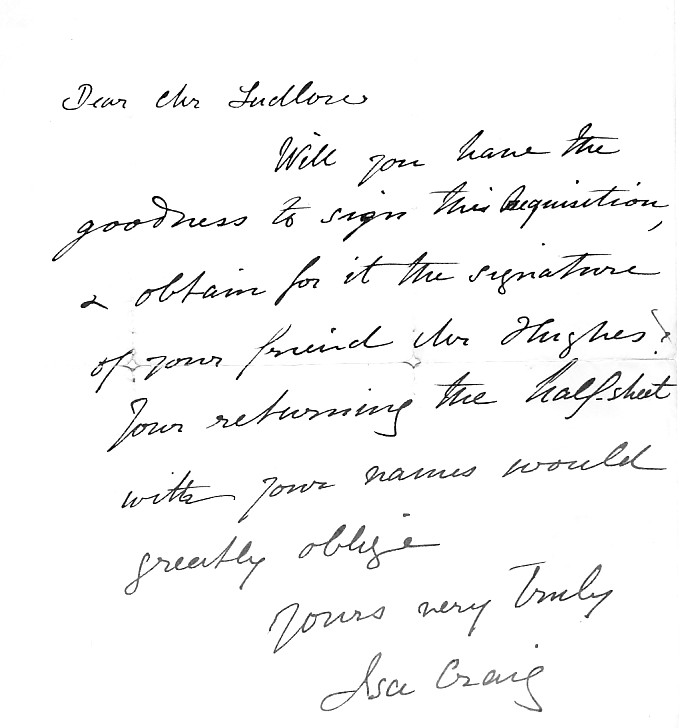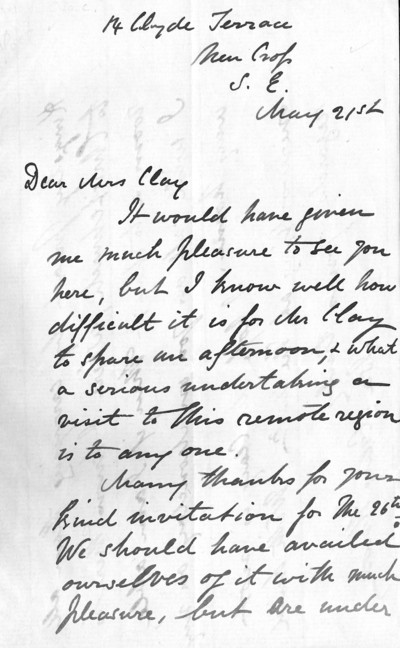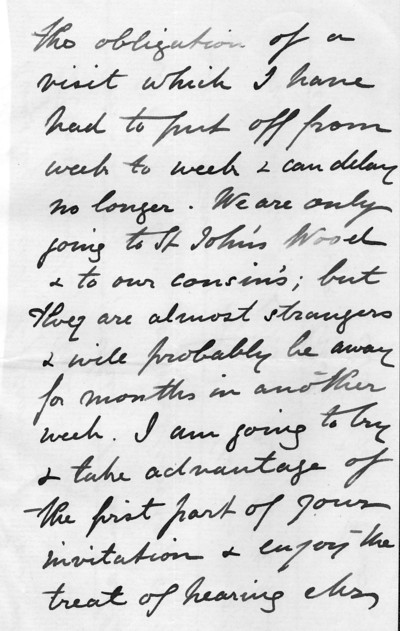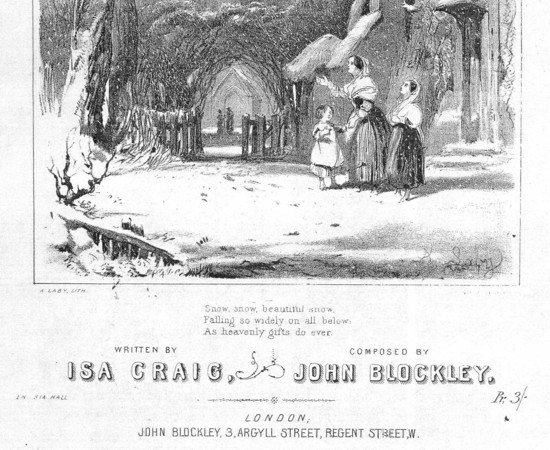|
SAMPLES
OF ISA CRAIG'S CORRESPONDENCE
 |
|
Dear Mr Ludlow
Will you have the goodness to sign this requisition, & obtain
for it the signature of your friend Mr Hughes? Your
returning the half-sheet with your names would greatly oblige
Yours very truly
Isa Craig |
|
|
Considering the business-like character of this letter ―
and also its signature, 'Craig' rather than the 'Craig Knox' that
Isa adopted following her marriage to her cousin, John Knox (17th
May, 1866) ― it most likely dates from the period 1858-66 during which
Isa worked as assistant to G. W. Hastings, Secretary of the
National
Association for the Promotion of Social Science. 'Mr. Ludlow' is possibly
the Christian Socialist, 'J. M. Ludlow', in which case 'Mr. Hughes'
might well be the 'Rev. Thomas Hughes', author of "Tom Brown's
Schooldays." |
――――♦――――

|
3 Waterloo Place
Pall Mall
S.W.
Sir
I would willingly have complied with your request, but I find
that at present I cannot undertake any addition to my work, which
for the last six months has been very arduous, & fearing the failure
of my health I am about to visit Scotland for a month's rest as soon
as the bulky volume I am assisting to edit is out of my hands.
Yours faithfully
I Craig
E. Walford Esq |
|
Another undated letter which, in
common with the previous example, was probably also written prior to
Isa's marriage (17 May, 1866). Much more formal in tone than
the earlier letter to Ludlow rather suggests that Isa and Walford
were not acquainted. One can only speculate on the identities
of the addressee and of the "bulky volume" to which she refers; the latter
was probably an edition of papers of the "National Association for
the Promotion of Social Science" (NAPSS), which Isa edited
when serving as their Assistant Secretary during the period 1858-66. 'E. Walford' might have
been Edward Walford (1823–1897), a writer
and compiler of reference works, and an author of magazine articles. |
――――♦――――
|
 |
 |
|
 |
|
New
Cross
S. E.
May 21st
Dear
Mrs Clay
It would have given me much pleasure to see you here, but I know
well how difficult it is for Mr Clay to spare an afternoon, and what
a serious undertaking a visit to this remote region is to any one.
Many thanks for your kind invitation for the 26th.
We should have availed ourselves of it with much
pleasure, but are under the obligation of a visit which I have had
to put off from week to week & can delay no longer. We are
only going to St. John's Wood & to our cousin's; but they are almost
strangers & will probably be away for months in another week.
I am going to try & take advantage of the first part of your
invitation & enjoy the treat of hearing Mr. Kingsley preach by
carrying them all to Christchurch, where I know there is room & to
spare; then, if I am able, I will call on you on Monday on my way
home.
I hope Mr Clay is not overworking at the Assn.
With kind regards.
Yours truly
Isa Craig Knox |
|
|
From the days
before the telephone and e-mail superseded the domestic letter, this
example probably dates from the latter part of the period 1865-75, by
which time Mrs Craig Knox had removed to S.E. London. Isa's
reference to "hearing Mr Kingsley preach" could refer to the Christian
Socialist, Charles Kingsley, who died in 1875.
Isa's
reference to the "Assn." in the
final sentence is probably to the "National Association for the Promotion
of Social Science", where Isa was employed before her marriage as
assistant to the Secretary; if so, 'Mr Clay' might have been
her replacement. |
――――♦――――
|
 |
|
"Beautiful
Snow"
A song, with words by Isa Craig and music by
John Blockley (ca. 1870).
7 pages .pdf format, 3MB.
To
download, right click this link,
then 'Save Target As.' |
|
John
Blockley (1800-82) was one of a number of composer publishers who set
the best poems (Tennyson, Longfellow, Norton, etc.) to their music and in
so doing made a huge amount of money. His work was initially
published from the 1820's and, by 1856, he had set up his own publishing
business. On his death
in 1882, his son John Thomas took over and continued the family firm until
it was
bought by Ascherberg, Hopwood & Crew. The front cover is by the
noted lithograph artist, Alexander Laby (1814-99) who also had a
small reputation as a minor religious painter. Laby worked
extensively for Blockley.
|
|
